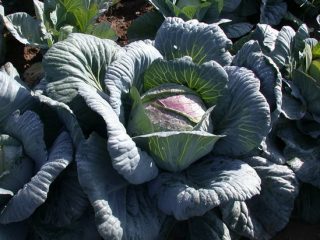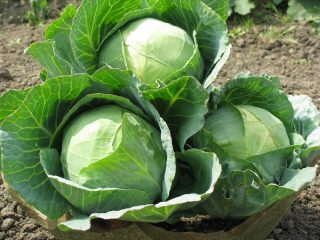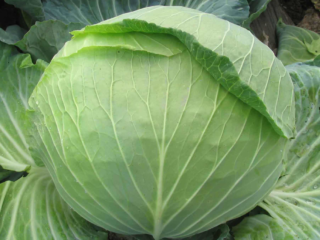Content
- 1 The chemical composition of cauliflower
- 2 Why cauliflower is useful for the body
- 3 How useful is cauliflower
- 4 The harm of cauliflower
- 5 Contraindications to cauliflower
- 6 Rules for the use of cauliflower
- 7 The use of cauliflower in traditional medicine
- 8 Is it possible for pregnant women to eat cauliflower
- 9 Conclusion
The benefits and harms of cauliflower is an interesting question for fans of healthy eating. To use a beautiful and tasty vegetable correctly, you need to understand its properties and characteristics.
The chemical composition of cauliflower
Cauliflower is popular and loved for its delicious taste and beautiful appearance. But the beneficial composition of the vegetable is of great importance. Cabbage pulp contains:
- vitamin C - over 70% of the daily value;
- vitamins of subgroup B - from B to B9, especially vitamin B5 is present in the vegetable;
- vitamins H, E and PP acid;
- uncommon vitamin K;
- small amounts of beta-carotene and vitamin A;
- silicon - about 73% of the daily dosage;
- potassium, phosphorus and manganese;
- calcium, magnesium and molybdenum;
- fiber, fatty acids and starch;
- iron, iodine and copper;
- zinc and selenium;
- mono - and disaccharides;
- sodium and chromium;
- sterols.
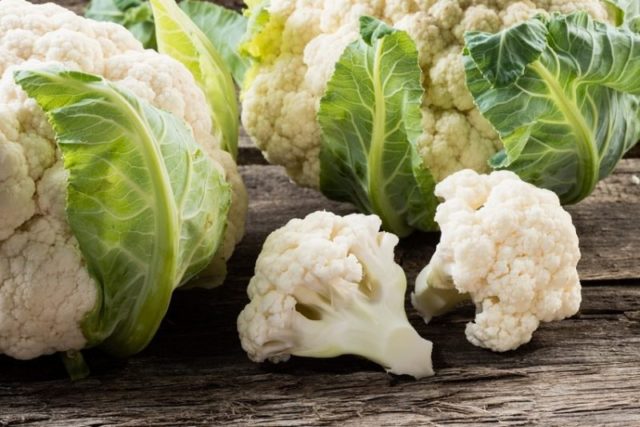
The vegetable contains especially a lot of vitamin C and silicon.
Basically, cabbage consists of carbohydrates - about 4.2 g in the volume of the product. Also, the vegetable contains 2.5 g of proteins and 0.3 g of fat.
The calorie content of the product is quite low - 30 kcal per 100 g. The glycemic index of the vegetable is 32 units, therefore, cauliflower with type 2 diabetes is not prohibited for consumption.
Why cauliflower is useful for the body
Vitamins in cauliflower have a very beneficial effect on the human body. In particular, the product:
- is a good natural antioxidant and reduces the risk of developing tumors;
- helps to fight inflammation of any nature;
- prevents the onset of vitamin deficiency and strengthens the immune system;
- removes accumulated toxins and toxic substances from the body;
- helps to lose extra pounds;
- has a beneficial effect on the hormonal and reproductive systems;
- protects eye health;
- strengthens blood vessels and prevents the development of heart ailments.
Cauliflower has a diuretic effect and helps fight puffiness. It can also be used to strengthen the nervous system and increase vigor.
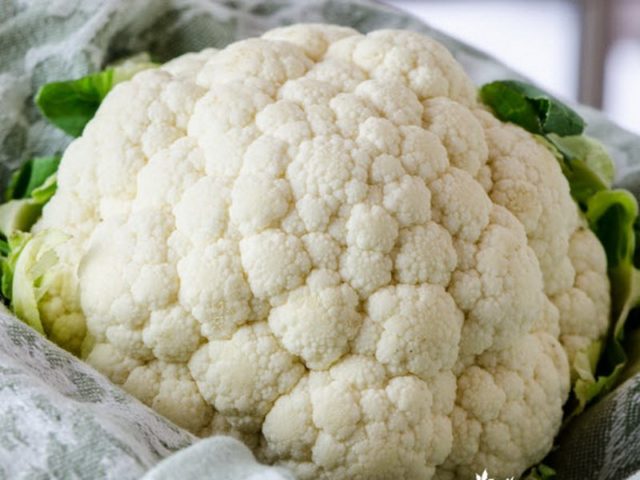
Cabbage inflorescences strengthen the immune system
Why cauliflower is good for women
For the female body, the vegetable is of great value. First of all, adding cauliflower to the menu is recommended for painful periods and unstable hormonal background during menopause. The product helps to get rid of uncomfortable sensations and also removes swelling.
For disorders of the nervous system, cauliflower soup, side dishes and salads with this vegetable will benefit. The product helps to get rid of chronic fatigue, increases vigor and gives strength, especially when consumed in the morning. If included in a regular diet, skin health will quickly improve, cauliflower stimulates the production of collagen, prevents acne breakouts and has a rejuvenating effect.
Why cauliflower is good for men
Cauliflower is a very useful vegetable for the male body. The valuable substances in the composition of the product are responsible for healthy sexual activity and support reproductive function. Also, the vegetable prevents the development of prostate cancer after 40 years.

Vegetable strengthens endurance in men
The product is useful for male athletes, it helps to get rid of fat mass without harming muscles, increases endurance and energy. Cauliflower strengthens the hair follicles and prevents early baldness, improves the functioning of the vascular system and helps cleanse the liver. This reduces the risk of ischemic attacks at a young age.
The benefits of cauliflower for children
When used correctly, cauliflower can strengthen a child's immune system and digestive system. The benefits of cauliflower for infants and older children are manifested with constipation and slow digestion, with a lack of vitamins in the diet.
You can offer the product to a child after 6 months of life. Since the vegetable contains a lot of fiber, earlier cabbage inflorescences may simply not be absorbed by the child's body. For the first time, the product is introduced into the baby's diet in a boiled form, crushed to a puree state. A fresh vegetable can be offered to a child no earlier than at 8 months and only in an amount of no more than 1 teaspoon.
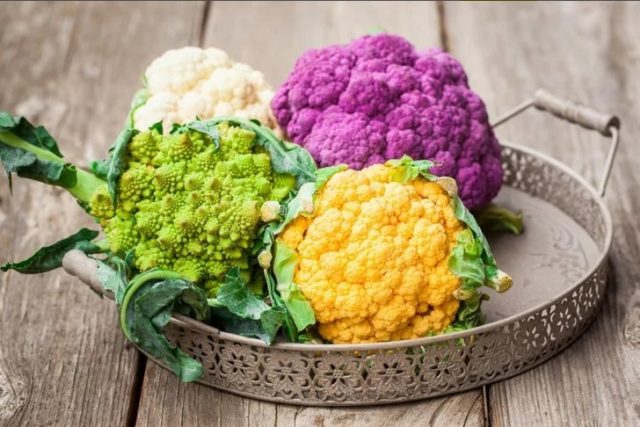
Children are allowed to give cauliflower from 6 months and after boiling
How useful is cauliflower
The vegetable is used in all kinds of dishes after boiling, stewing, baking and frying, and is added to salads. Above all, the benefits of raw cauliflower, the vegetable retains all the vitamins and minerals in its entirety. It should be especially noted that cauliflower rarely irritates the digestive tract, and its use usually does not lead to negative consequences.
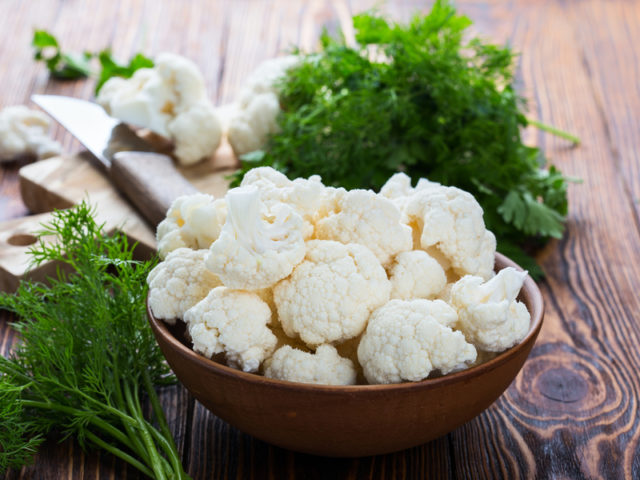
The content of vitamins in fresh cabbage is maximum
But if fresh cabbage inflorescences cannot be consumed for some reason, they will also be useful in boiled form. Some of the vitamins will be destroyed by high temperatures, for example, vitamin C. However, the bulk of the valuable substances in boiled cauliflower will remain.
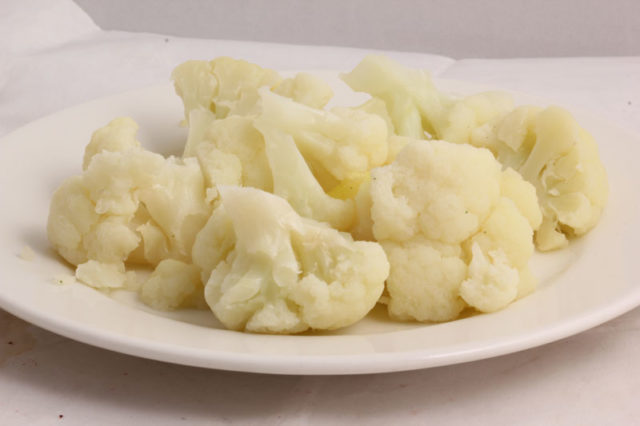
When boiled in inflorescences, only part of the vitamins is destroyed.
The benefits of frozen cauliflower are worth mentioning. The inflorescences can be preserved for up to 12 months by placing them in the freezer. After defrosting, all vitamins in their entirety will still be present in the vegetable.
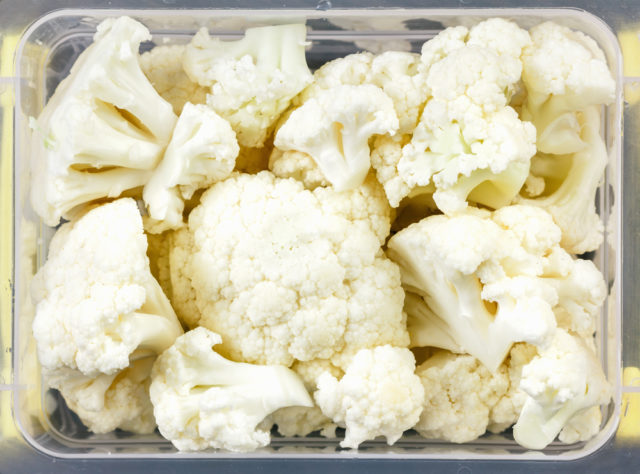
Frozen inflorescences retain their benefits for up to a year
The harm of cauliflower
It is necessary to eat a vegetable in accordance with some rules, otherwise it can damage the body:
- Eating cabbage inflorescences is harmful shortly before bedtime, the product triggers an active work of digestion and can interfere with night rest.
- Eating inflorescences is harmful on an empty stomach. It is better to eat a vegetable in combination with other foods with a full meal, so as not to provoke excessive gas formation.
- Cauliflower can damage with gout; the vegetable contains purines that can lead to an exacerbation of the disease.
The product can be harmful with flatulence and a tendency to diarrhea. The use of cabbage for these ailments should be reduced to a minimum.
Contraindications to cauliflower
For some diseases, it is recommended to completely remove the vegetable from the diet. You can't eat cauliflower:
- in case of disorders in the thyroid gland;
- with exacerbated gastritis with high acidity;
- with exacerbations of stomach ulcers, colitis and enterocolitis;
- in the acute phase of pancreatitis and cholecystitis;
- with individual allergies.
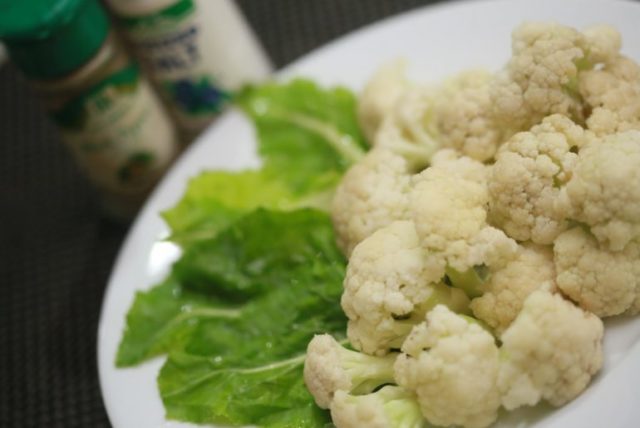
Vegetables are not recommended for exacerbations of gastrointestinal ailments
Since the product enhances peristalsis, it is not recommended to introduce it into the diet for the first time after operations on the abdomen or chest.
Rules for the use of cauliflower
To get the most out of the product, you need to stick to moderate dosages:
- In the absence of contraindications, an adult can eat up to 1.5 kg of the product during the day. But it is better to limit yourself to smaller portions so that the vegetable does not lead to discomfort in the intestines.
- In the presence of gastric diseases, the use of cauliflower should be severely limited. It is allowed to eat no more than 150 g of the product per day, otherwise side reactions are possible.
- With chronic ailments of the stomach and intestines, the vegetable must be boiled, stewed or baked before use. It is allowed to use a decoction of cauliflower, it does not harm the digestion, but it contains many vitamins.
- It is best to eat cabbage inflorescences not daily, but three times a week.

Cabbage inflorescences can be boiled very quickly and fried in batter
The vegetable is especially prized for its quick preparation. For example, cauliflower in batter can serve as a decoration for everyday and festive tables, and it takes about 15 minutes to create a dish.
It is best to eat dishes with cauliflower in the morning or evening, when the vegetable will bring the maximum benefit to the body.
The use of cauliflower in traditional medicine
The beneficial properties of cauliflower are used to treat ailments. A vegetable has a beneficial effect on the body, not only when consumed as food, but medicinal mixtures and drinks are prepared on its basis.
From heart disease
For problems with blood vessels and heart, it is recommended to take medicine from cauliflower with the addition of horseradish and honey. Prepare a mixture according to this recipe:
- fresh cauliflower is passed through a blender and squeezed out with 100 ml of juice;
- mixed with 150 g of grated horseradish;
- add 2 small spoons of honey and a pinch of finely chopped parsley to the mixture.
The thick mixture is consumed at 3 large spoons twice a day. Treatment
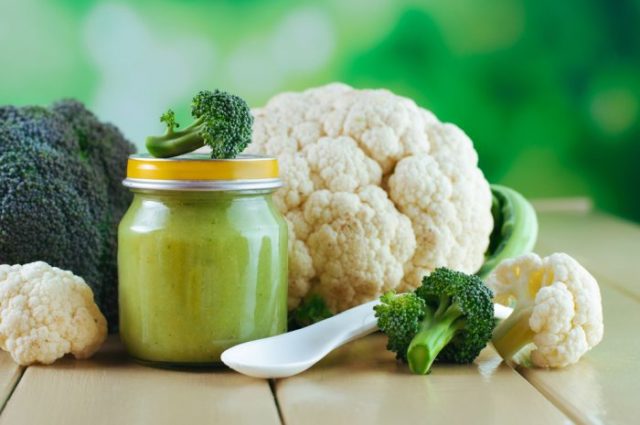
A mixture of cabbage and horseradish strengthens the heart and blood vessels
For constipation
Cauliflower juice helps with sluggish digestion and constipation. It is necessary to grind a fresh vegetable in a blender, squeeze 100 ml of fresh juice through cheesecloth and drink half an hour before a meal.
If you take the juice on a regular basis in combination with a balanced diet, digestion will accelerate and peristalsis will become more active.
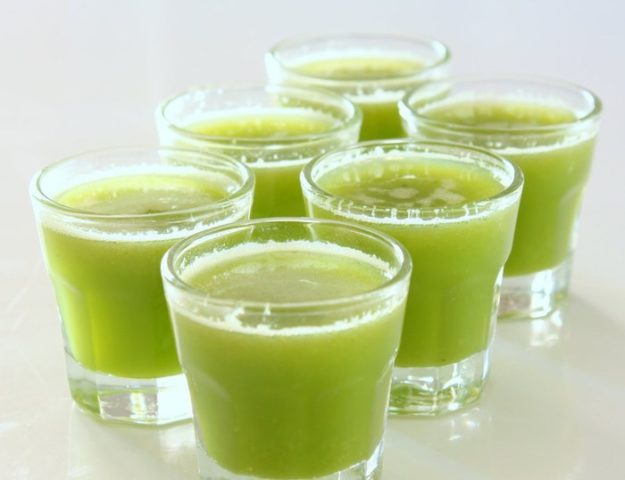
Vegetable juice helps relieve constipation
With inflammation of the gums
Vegetable juice has anti-inflammatory properties and helps with gum disease. It is necessary to mix a small amount of fresh juice with clean water in a ratio of 1 to 1 and rinse your mouth 5 times a day until the symptoms disappear.
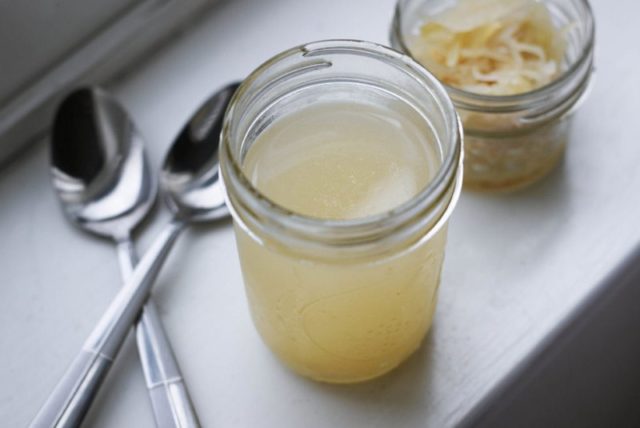
Diluted cabbage juice can be used to rinse sore gums
With hemorrhoids
The symptoms of hemorrhoids are well eliminated by the pickle of sauerkraut inflorescences. To prepare it you need:
- finely chop a few inflorescences;
- place in a small sterilized jar;
- Sprinkle generously with salt and close the lid.
Within 2 days, the vegetable will let out the juice, and after that the brine will be ready for use. You need to take it 100 ml on an empty stomach twice a day, the whole treatment is continued for 2 weeks.
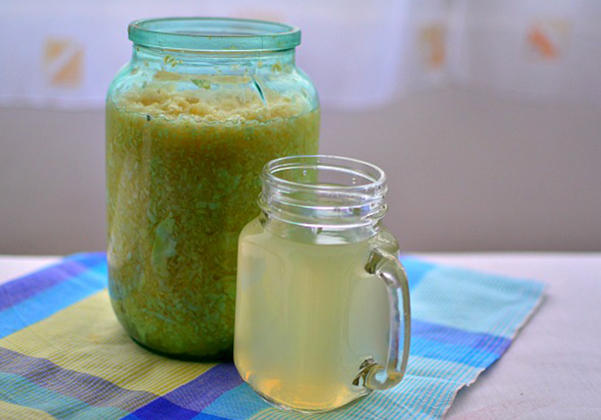
Cabbage brine is good for hemorrhoids
With atherosclerosis
Cauliflower strengthens blood vessels and lowers cholesterol levels. With atherosclerosis or for the prevention of the disease, it is recommended to drink such a remedy:
- beet, cabbage and carrot juice are mixed in equal proportions of 200 ml;
- add 50 ml of vodka;
- add 1 small spoonful of fresh lemon juice and horseradish juice;
- add 2 small spoons of natural honey.
You need to take the drink in small quantities, just 1 small spoon three times a day for 10 days.
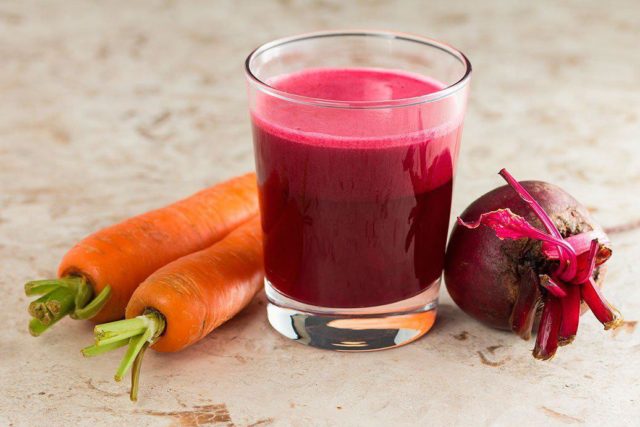
Tincture of beetroot, cabbage and carrot juice strengthens blood vessels well
With vitamin deficiency
Cabbage inflorescences contain many vitamins and help to replenish the deficiency of nutrients in the body. Of particular benefit will be a drink made from cabbage and apple juice, the ingredients are mixed in equal proportions and 1 glass is taken daily.
You need to drink a vitamin cocktail for a month. The remedy will be especially beneficial in spring and autumn.
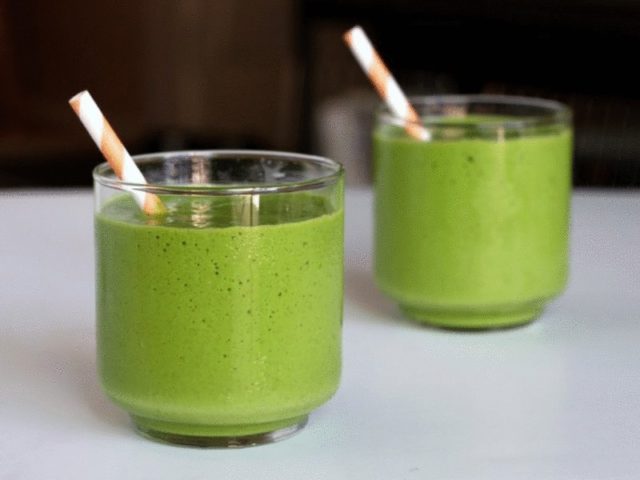
Apple-cabbage cocktail replenishes vitamin deficiencies
For colds
Cauliflower strengthens the immune system and helps ward off colds and flu. For prevention and treatment, you can prepare the following cocktail:
- mix 100 ml of carrot and cabbage juice;
- add 200 ml of milk;
- add 2 tablespoons of honey.
They drink the product on an empty stomach, only 50 ml three times a day. For prevention purposes, the medicine is taken within a month; for treatment, you need to drink a cocktail before
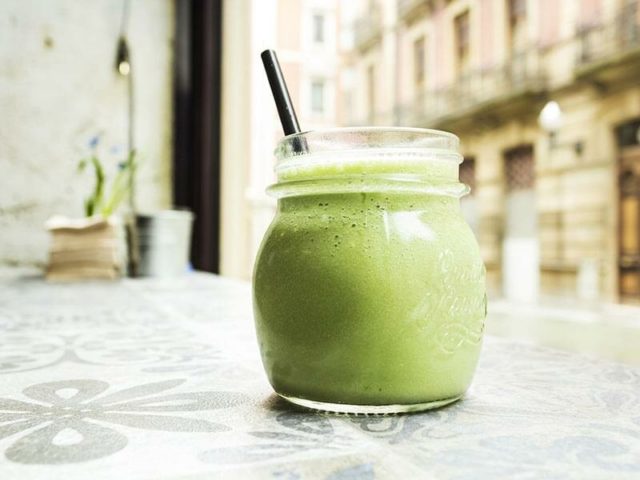
Cabbage juice with honey is a good remedy for colds
For skin diseases
The antibacterial and anti-inflammatory properties of the product promote the healing of wounds, irritations and burns. It is necessary to grind several cabbage inflorescences in a blender, and then mix them with a raw egg. The mixture is applied to gauze and applied to the sore spot for 3-4 hours, fixing it with a bandage or bandage.
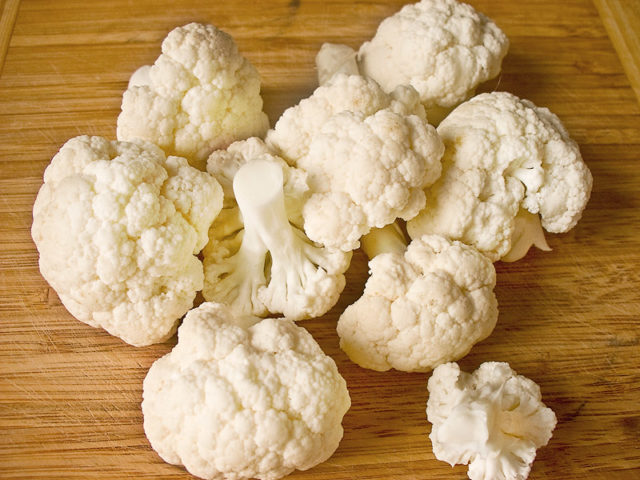
Inflorescences can be crushed to make a compress
Is it possible for pregnant women to eat cauliflower
During the period of gestation, cauliflower is very beneficial for the woman and the fetus. The product contains B vitamins, including folic acid, which is responsible for the formation of the child's nervous system and brain. Ascorbic acid in the vegetable protects the body of the expectant mother from viruses and colds, and fiber contributes to normal digestion and prevents constipation.
Coenzyme Q10 is present in the pulp of the vegetable, which serves as the prevention of stretch marks. The low calorie content of cabbage inflorescences allows a woman not to gain extra pounds while carrying a child.
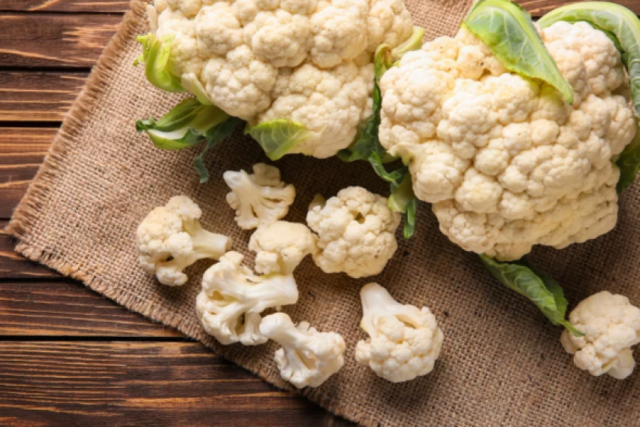
For pregnant women, the product is especially useful when boiled.
As for the period of breastfeeding, it is allowed to add the product to the diet 3 months after childbirth. In this case, the vegetable will improve the woman's digestion and will not harm the baby.
Conclusion
The benefits and harms of cauliflower depend on the dosage of its use and on the presence of contraindications. If you take the vegetable in small portions, then the effect will be positive, the cauliflower will strengthen health and improve bowel function.



